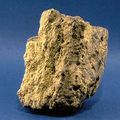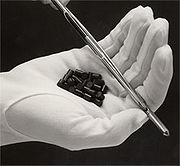Nuclear engineering
Nuclear engineering is the branch of engineering concerned with the application of the breakdown of atomic nuclei and/or other sub-atomic physics, based on the principles of nuclear physics. It includes, but is not limited to, the interaction and maintenance of nuclear fission systems and components— specifically, nuclear reactors, nuclear power plants, and/or nuclear weapons. The field also includes the study of nuclear fusion, medical and other applications of (generally ionizing) radiation, radiation safety, heat/thermodynamics transport, nuclear fuel and/or other related (e.g., waste disposal) technology, nuclear proliferation, and the effect of radioactive waste or radioactivity in the environment.
Professional areas
Nuclear fission
Nuclear fission is the disintegration of a susceptible atom's nucleus into two different, smaller elements and other particles including neutrons. Approximately 2.4 neutrons are released per fission, which may cause additional fissions if enough fissionable material is present.
The common types of nuclear fission include thermal fission, which is fission caused by the absorption of a relatively slow thermal neutron with kinetic energy approximately 0.025 eV. Fast fission is fission caused by the absorption of a more energetic neutron, with kinetic energy on the order of MeV. Also, in especially heavy nuclei, spontaneous fission may occur. Nuclei that are fissionable by neutrons typically carry at least a very small chance of spontaneous fission occurring.
Generally, thermal fission is used in commercial reactors, though Fast Breeder Reactors have been developed to harness fast fission.
The United States gets about 20% of its electricity from nuclear power. Nuclear engineers in this field generally work, directly or indirectly, in the nuclear power industry or for national laboratories. Current research in the industry is directed at producing economical, proliferation-resistant reactor designs with passive safety features. Although government labs research the same areas as industry, they also study a myriad of other issues such as nuclear fuels and nuclear fuel cycles, advanced reactor designs, and nuclear weapon design and maintenance. A principal pipeline for trained personnel for US reactor facilities is the Navy Nuclear Power Program.
 Nuclear Powerplant |
.jpg) B-61 thermonuclear weapon |
Nuclear fusion and plasma physics
Research areas in nuclear fusion and plasma physics include high-temperature, plasma dynamics, and radiation-resistant materials. Internationally, research is currently directed at building a prototype tokamak called ITER. The research at ITER will primarily focus on instabilities and diverter design refinement. Researchers in the USA are also building an inertial confinement experiment called the National Ignition Facility or NIF. NIF will be used to refine neutron transport calculations for the US stockpile stewardship initiative.
 NIF (National Ignition Facility) target chamber |
Nuclear medicine and medical physics
An important field is medical physics, and its subfields nuclear medicine, radiation therapy, health physics, and diagnostic imaging.[1] From x-ray machines to MRI to PET, among many others, medical physics provides most of modern medicine's diagnostic capability along with providing many treatment options.
 X-Ray Image of a male skull |
 Magnetic Resonance Imaging scan of a head |
 PET taken with an ECAT Exact HR+ PET Scanner |
Nuclear materials and nuclear fuels
Nuclear materials research focuses on two main subject areas, nuclear fuels and irradiation-induced modification of materials. Improvement of nuclear fuels is crucial for obtaining increased efficiency from nuclear reactors. Irradiation effects studies have many purposes, from studying structural changes to reactor components to studying nano-modification of metals using ion-beams or particle accelerators.
 Uranium ore, the principal raw material of nuclear fuel |
 Nuclear fuel pellets |
 A Focused ion beam |
Radiation measurements and dosimetry
Nuclear engineers and radiological scientists are interested in the development of more advanced ionizing radiation measurement and detection systems, and using these to improve imaging technologies. This includes detector design, fabrication and analysis, measurements of fundamental atomic and nuclear parameters, and radiation imaging systems, among other things.
 A modern Geiger counter |
 A neutron detector |
 Scintillation detector next to Uraninite |
Nuclear engineering organizations
- American Nuclear Society
- Nuclear Institute (UK)
- International Atomic Energy Agency
List of institutions offering nuclear engineering courses
List of universities in Bulgaria
| University | Department (external links) | Degrees offered |
|---|---|---|
| Sofia University "St. Kliment Ohridski" Faculty of Physics | Department of Nuclear Engineering | BS, MS, PhD |
| College | Department (external links) | Degrees offered |
|---|---|---|
| Technical University of Sofia | Department of Thermal and Nuclear Power Engineering | BS, MS, PhD |
List of universities in Canada
| University | Department (external links) | Degrees offered |
|---|---|---|
| McMaster University, Hamilton | Engineering Physics (Nuclear Engineering Option) | B.Eng. Phys., Dipl. Nuc.Tech, M.Eng, M.A.Sc, Ph.D. |
| University of Ontario Institute of Technology, Oshawa | Nuclear Engineering | B.Eng, M.Eng, M.A.Sc, Ph. D |
| École Polytechnique de Montréal, Montréal | Institute of Nuclear Engineering | M.Eng, M.Sc, PhD |
| Royal Military College of Canada, Kingston | Department of Chemistry and Chemical Engineering | M.Sc, M.A.Sc, M.Eng, PhD |
List of colleges in India
| College | Department (external links) | Degrees offered | |||
|---|---|---|---|---|---|
| Indian Institute of Technology, Kanpur | Nuclear Engineering and Technology | M.Tech, PhD | |||
| Sastra university,Tanjore | [1] | M.Tech | |||
| Delhi University | [2] | M.Tech | J.N.T.UNIVERSITY KAKINADA,KAKINADA,ANDHRA PRADESH | www.jntukakinada.edu.in | M.E |
List of universities in Israel
| College | Department (external links) | Degrees offered' |
|---|
List of colleges in Pakistan
| College/University | Department (external links) | Degrees offered |
|---|---|---|
| Pakistan Institute of Engineering & Applied Sciences, Islamabad | Department of Nuclear Engineering | MS,PhD |
| Kannup Institute of Nuclear Power Engineering/NED University of Engineering & Technology, Karachi | Department of Nuclear Engineering | MS,PhD |
| Chasnupp Center for Nuclear Training (CHASCENT), Chasma | Center for Nuclear Training and Engineering | MS,PhD |
List of universities in Switzerland
| University | Department (external links) | Degrees offered |
|---|---|---|
| EPF Lausanne and ETH Zurich | Nuclear Engineering | MS, PhD |
List of colleges in Turkey
| College | Department (external links) | Degrees offered |
|---|---|---|
| Hacettepe University | Department of Nuclear Engineering | BS,MS,PhD |
List of universities in the United Kingdom
| College | Department (external links) | Degrees offered |
|---|---|---|
| Lancaster University | Nuclear Engineering | M.Eng |
| University of Birmingham | Physics and Technology of Nuclear Reactors | MSc |
| Nuclear Technology Education Consortium | Nuclear Science and Technology | MSc |
| Nottingham Trent University | Physics with Nuclear Technology | BSc |
List of colleges in the U.S.
See also
|
|
References
External links
- Science and Technology of Nuclear Installation Open-Access Journal
- Nuclear Engineering International magazine
- Nuclear Science and Engineering technical journal
- Electric Generation from Commercial Nuclear Power
- Hacettepe University Department of Nuclear Engineering
|
||||||||||||||||||||||||||||||||||||||||||||||||||||
|
||||||||||||||||||||||||||